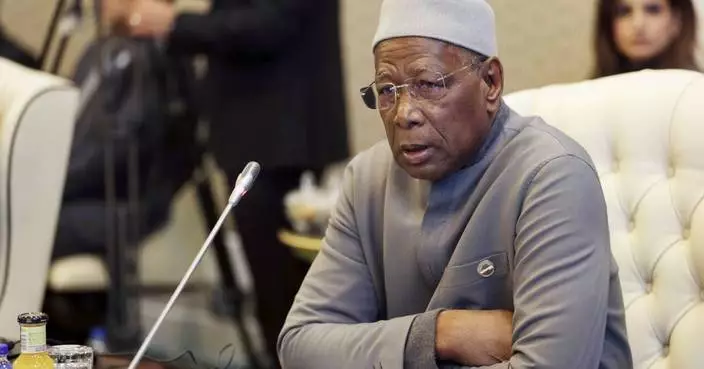The closure of Libya’s major oil fields and production facilities has resulted in losses of more than $255 million in the six-day period ending Jan. 23, the country’s national oil company said Saturday.
The closures came when powerful tribal groups loyal to military commander Khalifa Hifter earlier this month seized several large export terminals along the eastern coast as well as southern oil fields. Hifter controls the eastern and much of the southern part of the country.
The moves were meant to challenge Hifter’s adversaries in the west, the U.N.-backed, but weak rival government that controls the capital, Tripoli.
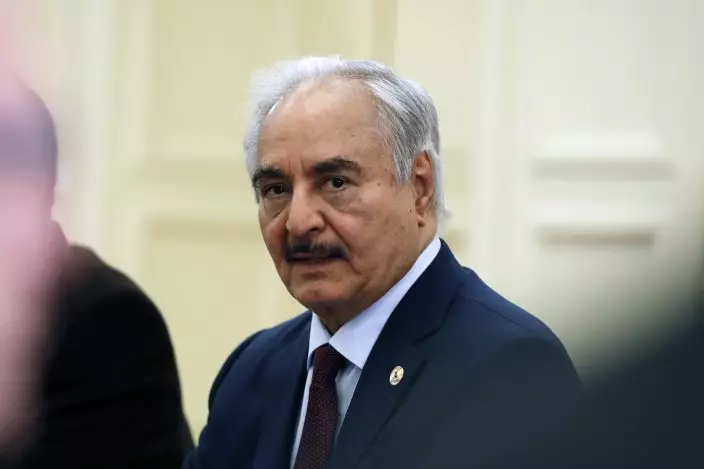
Libyan Gen. Khalifa Hifter joins a meeting with the Greek Foreign Minister Nikos Dendias and other officials in Athens, Friday, Jan. 17, 2020. The commander of anti-government forces in war-torn Libya has begun meetings in Athens in a bid to counter Turkey's support for his opponents. (AP PhotoThanassis Stavrakis)
The National Oil Corporation, which dominates Libya’s critical oil industry, said its assessment showed that “the illegal shut down of its facilities has resulted in losses of nearly 256.5 million USD until January 23.”
It said oil production has fallen from over 1.2 million barrels a day to 320.154 barrels a day.
“ Until January 23, 2020, the cumulative production losses in barrels reached 3,907.318 barrels in six days,” NOC said.
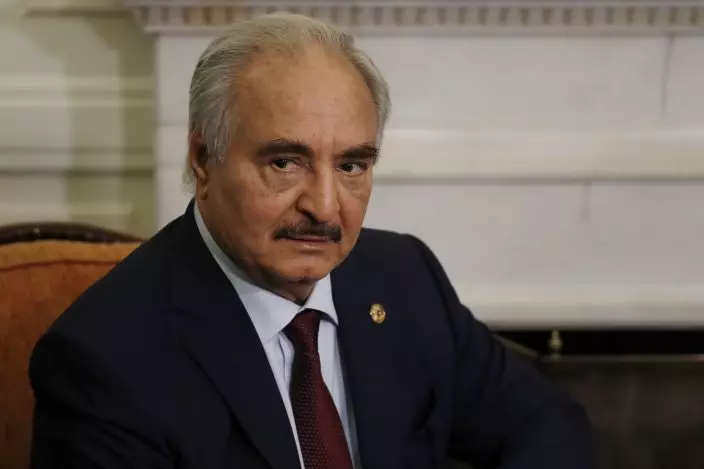
Libyan Gen. Khalifa Hifter joins a meeting with the Greek Foreign Minister Nikos Dendias in Athens, Friday, Jan. 17, 2020. The commander of anti-government forces in war-torn Libya has begun meetings in Athens in a bid to counter Turkey's support for his opponents. (AP PhotoThanassis Stavrakis)
The corporation has sought to reassure Libyans. It said “fuel is still available in most regions” and that it had “sufficient storage in Central and Eastern regions.”
The closure was seen as part of Hifter’s efforts to take control of Tripoli and punish his adversaries there for sealing security and maritime agreements with Turkey, opening doors for unlimited military support from the Turks.
Oil, the lifeline of Libya’s economy, has long been a key factor in the civil war, as rival authorities jostle for control of oil fields and state revenue. Libya has the ninth largest known oil reserves in the world and the biggest oil reserves in Africa.
The closure “almost certainly was meant to remind foreign states that Hifter retains control over the country’s oil and gas facilities, which generate almost all the country’s income, even as he enjoys no access to the revenues, which accrue to his Tripoli rivals,” the International Crisis Group, a Brussels-based think tank, said in a report earlier this week.
“His message: the conflict must be resolved in a manner that reflects the actual power balance on the ground, which he views as being squarely in his favor,” the report said.
The closure came just two days before world powers with interests in Libya’s long-running conflict pledged in a summit in Berlin to respect a much-violated arms embargo and push opposing factions to reach a truce.
Hifter’s self-styled Libyan Arab Armed Forces began the offensive on the capital in April last year, clashing with an array of militias, loosely allied with the Tripoli-based government. The clashes killed over 3,000 people and displaced 200,000 people in Tripoli.
The offensive has threatened to plunge Libya into chaos rivaling the 2011 conflict that ousted and later killed long-time dictator Moammar Gadhafi.
The civil war has been on the brink of a major escalation in recent weeks. Various foreign players back Libya’s rival governments, and they have recently been stepping up their involvement in the oil-rich nation’s conflict.
Hifter is backed by Egypt, Russia and the United Arab Emirates, while the embattled U.N.-backed government is aided by Turkey and Qatar.
Forced to hide her true self, Joe Horras’ transgender daughter struggled with depression and anxiety until three years ago, when she began to take medication to block the onset of puberty. The gender-affirming treatment helped the now-16-year-old find happiness again, her father said.
A decision by the U.S. Supreme Court late Monday allowing Idaho to enforce its ban on such care for minors could jeopardize her wellbeing once again. Horras is scrambling to figure out next steps and is considering leaving Idaho, where he's lived his whole life, to move to another state.
"It would be devastating for her," Horras, who lives in Boise, told The Associated Press. “If she doesn’t have access to that, it will damage her mental health."
Horras is among the Idaho parents desperate to find solutions after their trans children lost access to the gender-affirming care they were receiving. The U.S. Supreme Court's decision allows the state to put in place a 2023 law that subjects physicians to up to 10 years in prison if they provide hormones, puberty blockers or other gender-affirming care to people under age 18. A federal judge in Idaho had previously blocked the law in its entirety.
The ruling will hold while lawsuits against the law proceed through the lower courts, although the two transgender teens who sued to challenge the law will still be able to obtain care.
At least 24 states have adopted bans on gender-affirming care for minors in recent years, and most of them face legal challenges. Twenty of those states besides Idaho are currently enforcing the bans.
Monday’s ruling was the first time the U.S. Supreme Court waded into the issue. The court’s 6-3 ruling steered clear of whether the ban itself is constitutional. Instead, the justices went deep into whether it’s appropriate to put enforcement of a law on hold for everyone, or just those who sue over it, while it works its way through the courts.
In his concurring opinion, Justice Neil Gorsuch said “lower courts would be wise to take heed” and limit use of “universal injunctions” blocking all enforcement of laws that face legal challenges. In a dissent, Justice Ketanji Brown Jackson said the court should not decide the fate of those actions without reading legal briefs and hearing arguments on the issue.
Rights groups in Idaho are supporting families to make sure they're aware the measure has taken effect. The American Civil Liberties Union of Idaho said it plans to hold a virtual event over Zoom with licensed counselors and legal experts to help people process the shock and answer any questions they may have about the law.
“Yesterday was really just an outpouring of fear, questions, people trying to figure out how this is going to affect them personally,” said Jenna Damron, the group's advocacy fellow. “Getting information out quickly that is accurate is kind of our first priority.”
Paul Southwick, legal director for ACLU of Idaho, said the group wants families to know what their options are.
“Gender-affirming medical care is now immediately illegal for minors in the state of Idaho. However, care remains legal for adults, and it’s also legal for minors to seek gender-affirming medical care out of state,” he said.
In Boise, Horras' 16-year-old daughter wears an estrogen patch and receives estrogen injections every six months. Her last shot was in December and Horras now has two months to find a new out-of-state provider who can continue administering the medication. The situation has left him feeling scared, he said, and angry toward the state politicians who passed the law last year.
“It's cruel,” he said.
Advocates, meanwhile, worry that lower-income families won't be able to afford to travel across state lines for care. Arya Shae Walker, a transgender man and activist in the small city of Twin Falls in rural southern Idaho, said he was concerned that people would alter the doses of their current prescriptions in order to make them last longer. His advocacy group has already taken down information on its website on gender-affirming care providers for young people in the area out of concern of potential legal consequences.
The broader issue of bans on gender-affirming care for minors could eventually be before the U.S. Supreme Court again. Last year, a ban on gender-affirming care for minors in Arkansas was shot down by a federal judge, while those in Kentucky and Tennessee were allowed to be enforced by an appeals court after being put on hold by lower-court judges. Montana’s law is not being enforced because of a ruling from a state judge.
Laws barring transgender youth from playing on sports teams that align with their gender identity are also being challenged across the country. An appeals court on Tuesday ruled that West Virginia’s transgender sports ban violates the rights of a teen athlete under Title IX, the federal civil rights law that prohibits sex-based discrimination in schools. Hours later, an Ohio law that bars transgender girls from girls scholastic sports competitions was put on hold by a judge. Set to take effect next week, the law also bans gender-affirming care for transgender youth.
Those who support the bans say they want to protect children and have concerns about the treatments themselves.
Gender-affirming care for youth is supported by major medical organizations, including the American Medical Association, the American Academy of Pediatrics and the American Psychiatric Association. However, England is limiting the ability of people younger than 16 to begin a medical gender transition.
The National Health Service England recently cemented a policy first issued on an interim basis almost a year ago that sets a minimum age at which puberty blockers can be started, along with other requirements. NHS England says there is not enough evidence about their long-term effects, including “sexual, cognitive or broader developmental outcomes.”
Medical professionals define gender dysphoria as psychological distress experienced by those whose gender expression does not match their gender identity. Experts say gender-affirming therapy can lead to lower rates of depression, suicidal thoughts and suicide attempts among transgender people.
Chelsea Gaona-Lincoln, executive director of Idaho-based advocacy group Add The Words, said she's anticipating “a pretty horrendous ripple effect.” But seeing her community uniting in support has given her a glimmer of hope.
“There are people coming together, and it’s so important, for especially our youth, to feel seen and affirmed as they are," she said.
Southwick, the legal director of ACLU of Idaho, said the 9th U.S. Circuit Court of Appeals is expected to hold a hearing this summer on its lawsuit challenging the law.
Associated Press writer Geoff Mulvihill in Cherry Hill, New Jersey, contributed.
This story was first published on April 16, 2024. It was updated on April 18, 2024, to make clear that the 20 states enforcing bans on gender-affirming care for minors are in addition to Idaho and all are among the 24 that have passed laws imposing the bans.
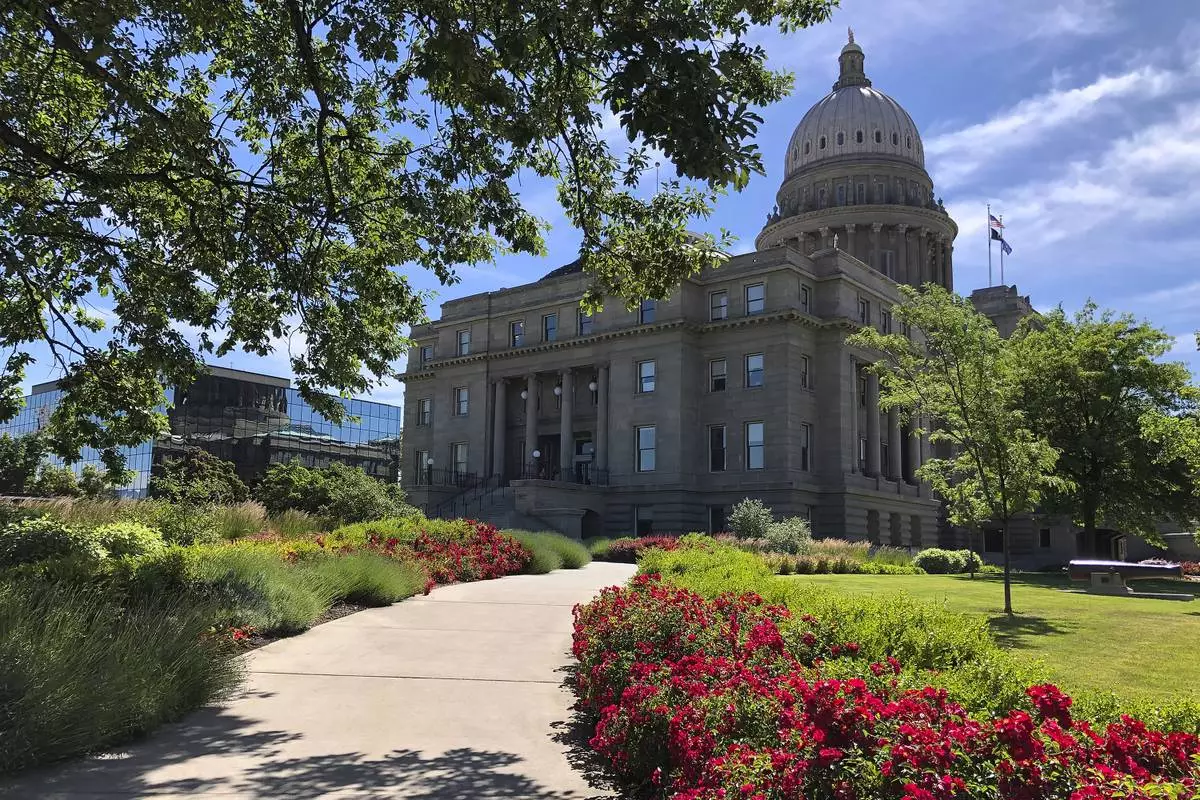
FILE - The Idaho State Capitol in Boise, Idaho, is seen on June 13, 2019. The U.S. Supreme Court's decision on Monday, April 15, 2024, allows the state to put in place a 2023 law that subjects physicians to up to 10 years in prison if they provide hormones, puberty blockers or other gender-affirming care to people under age 18. A federal judge in Idaho had previously blocked the law in its entirety. (AP Photo/Keith Ridler, File)
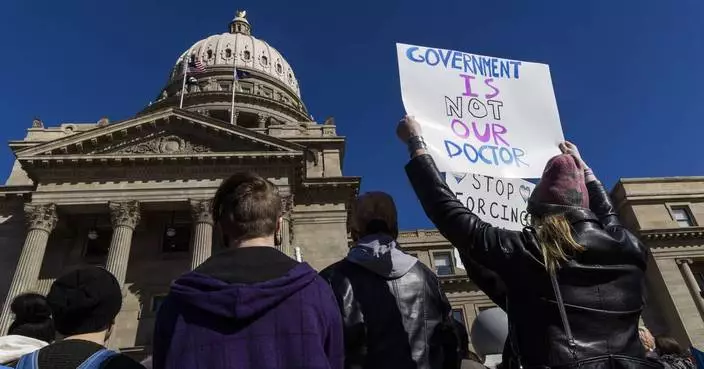
Idaho's ban on youth gender-affirming care has families desperately scrambling for solutions
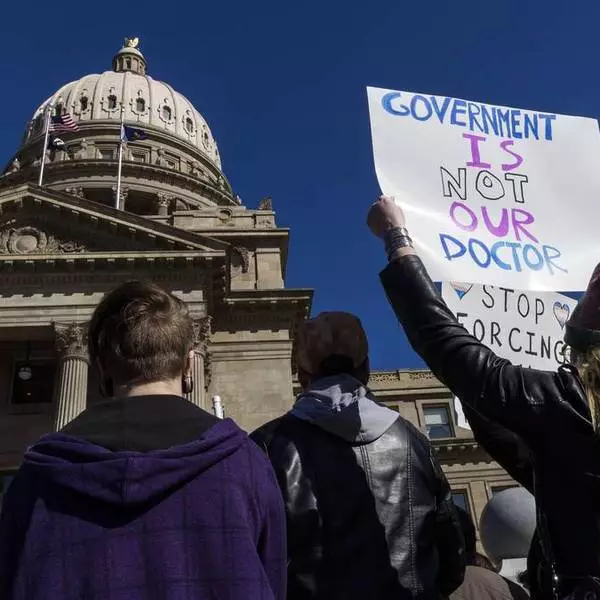
Idaho's ban on youth gender-affirming care has families desperately scrambling for solutions
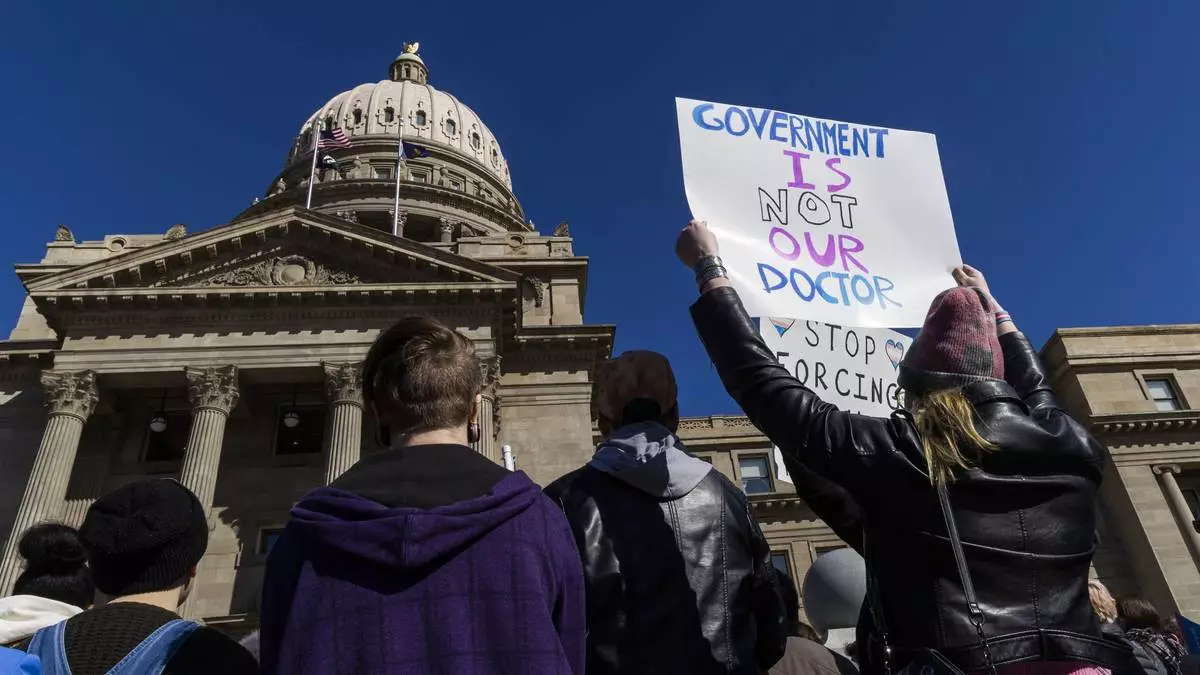
FILE - People gather in front of the Idaho Statehouse in opposition to anti-transgender legislation moving through an Idaho Republican congress, Friday, Feb. 24, 2023, in Boise, Idaho. The U.S. Supreme Court's decision on Monday, April 15, 2024, allows the state to put in place a 2023 law that subjects physicians to up to 10 years in prison if they provide hormones, puberty blockers or other gender-affirming care to people under age 18. A federal judge in Idaho had previously blocked the law in its entirety. (Darin Oswald/Idaho Statesman via AP, File)









